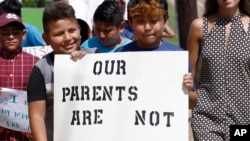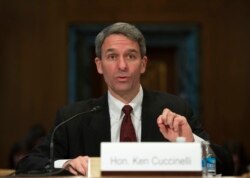Updated: Aug. 13, 2019, 1:35 a.m.
WHITE HOUSE — The Trump administration announced a new policy Monday that would impede immigrants already in the United States from obtaining permanent residency or citizenship if they use public benefits such as Medicaid, food stamps or housing assistance.
Ken Cuccineli, acting director of the U.S. Citizenship and Immigration Services, announced the "Inadmissibility on Public Charge Grounds" rule during a press briefing at the White House, noting the new policy would encourage "self-reliance and self-sufficiency for those seeking to come to or to stay in the United States."
The rule change will take effect Oct. 15, 2019. Under the rule, a public charge is defined as an individual who receives one or more designated public benefits for more than 12 months within any 36-month period. Receipt of two different benefits in one month counts as two months.
Cuccinelli said the administration wants to avoid situations where people who are adjusting their status become dependent on public benefits in the future.
"A public charge inadmissibility determination is prospective and looks at whether an individual is likely at any point in the future to become a public charge," he said.
The acting USCIS director said the rule does not impact humanitarian-based immigration programs for refugees and asylum-seekers, and contains exemptions for trafficking victims and victims of domestic violence. Exemptions for these categories are mandated by Congress.
Cucinnelli said the rule also does not impact family-based immigration, as citizens who sponsor family members for a green card already have to produce an "affidavit of support" showing that they can provide financial assistance.
Current law
Under the current immigration law, the U.S. Congress stated that legal permanent residents, also known as green card holders, can only be deported on public charge grounds in the first five years of obtaining their green cards.
Congress said an immigrant can only become a public charge based on situations that happened before the green card was obtained.
An example of this would be if a healthy legal permanent resident is involved in a car accident and needs government assistance. That person would not be deportable on public charge grounds.
Some immigrants can also get health care coverage under state insurance exchanges, but it is not clear if the federal government will take this into consideration under the new rule. Certain noncitizens are eligible for Supplemental Nutrition Assistance Program, or SNAP.
WATCH: Immigrant restrictions
'Xenophobic and classist'
Immigration groups are already protesting the rule. The New York Immigration Coalition, an advocacy group of more than 200-member organizations, called it "xenophobic and classist," and pledged to fight it.
Meanwhile, the National Immigration Law Center, an organization that defends the rights and opportunities of low-income immigrants, said it will sue the administration over this new rule, claiming in a tweet it is "designed to redefine our legal immigration system to disenfranchise communities of color & favor the white and wealthy."
The new rule is in line with the administration's effort to limit poor immigrants who might draw on taxpayer-funded benefits, while allowing more highly skilled and wealthy immigrants into the United States.
Although the rule has evolved significantly since the first leaked version appeared in February 2018, "it's always sought to impact the number of people who can access a green card through the legal immigration system," said Cristobal Ramon, a senior policy analyst at the Bipartisan Policy Center's Immigration Project. He added that "we need to see the rule's implementation to determine the extent to which it'll limit legal immigration to the United States."
A chilling effect
Immigration activists and scholars are also concerned that the new rule would have a chilling effect on legal immigrants and stop them from using public benefits they are otherwise eligible for. They fear that U.S. citizens or green card holders who need help may abstain from seeking it, despite eligibility, if they have family members who are in the process of applying for legal status.
Permanent residents and naturalized citizens may also be afraid of applying for public benefits, thinking it may impact their ability to remain in the United States.
Congressman Joaquin Castro, who chairs the Congressional Hispanic Caucus, said the rule "will mean that many immigrant families may no longer use critical programs they are legally entitled to that help their families thrive."
"We would not be the nation we are today without the contributions and sacrifices of immigrants who came to this country with nothing in their pockets," Castro said in a statement. "The Congressional Hispanic Caucus denounces this new rule, which is a thinly veiled excuse for a racially-motivated test to deny immigrants green cards based on their wealth."
Academic studies suggest that the new policy, together with the administration's rhetoric and immigration enforcement actions, have prompted some immigrants to stop using public benefits, said Ramon.
"It is likely that the new rule will accelerate this trend once immigrants start hearing about the rule's impact on their communities," he added.







